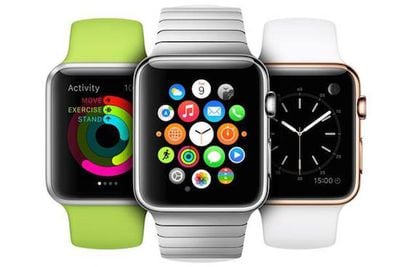Apple and Aetna Talked Data Privacy, Cost and More in Apple Watch Meeting
Apple and insurance provider Aetna met last week to discuss ways to offer discounted Apple Watch models to Aetna's 23 million subscribers, and CNBC has shared details on some of the topics that were discussed at the meeting, attended by Aetna employees, Apple executives, and health providers from major hospitals.
Aetna is aiming to determine whether the Apple Watch can be used by subscribers to improve health outcomes by encouraging them to exercise, eat better, and better manage health issues. Info on the meeting came from Mandy Bishop, an attendee who founded startup Lifely Insights. Much of the meeting consisted of feedback from Aetna employees who have been testing the Apple Watch.

Data privacy, including who had access to what data, was a major topic of discussion, with Apple explaining that Apple Watch health data can only be shared with third-party apps and companies with express user consent.
The Apple Watch's lack of situational awareness was brought up as a pain point, such as when the device delivers a stand notification when a user is on a plane or in another environment that makes standing difficult. Cost was also a significant topic of discussion.
One theme that emerged during the event, she said, is that many of those who were enrolled in the program wanted to get healthy alongside their families. But many couldn't afford to spend upwards of $1,000 on devices for their spouses and children.
The cost issue wasn't entirely resolved, she said, but it proved to be a sticking point. It remains unclear whether Aetna will extend its discounts from employees and/or members to their family-members.
Apple and Aetna are said to be planning to implement some kind of Apple Watch program in early 2018, which would see the company offering free or discounted Apple Watches to its subscribers.
Aetna already has a program that provides a free Apple Watch to its 50,000 employees and it already subsidizes the cost for some subscribers, with data from that program being used to determine if an expansion is worth it.
Popular Stories
If you have been experiencing issues with wireless CarPlay in your vehicle lately, it was likely due to a software bug that has now been fixed.
Apple released iOS 18.4.1 today, and the update's release notes say it "addresses a rare issue that prevents wireless CarPlay connection in certain vehicles."
If wireless CarPlay was acting up for you, updating your iPhone to iOS 18.4.1 should...
Apple is preparing a "bold" new iPhone Pro model for the iPhone's 20th anniversary in 2027, according to Bloomberg's Mark Gurman. As part of what's being described as a "major shake-up," Apple is said to be developing a design that makes more extensive use of glass – and this could point directly to the display itself.
Here's the case for Apple releasing a truly all-screen iPhone with no...
The first iOS 19 beta is less than two months away, and there are already a handful of new features that are expected with the update.
Apple should release the first iOS 19 beta to developers immediately following the WWDC 2025 keynote, which is scheduled for Monday, June 9. Following beta testing, the update should be released to the general public in September.
Below, we recap the key...
While the iPhone 17 Pro and iPhone 17 Pro Max are not expected to launch until September, there are already plenty of rumors about the devices.
Subscribe to the MacRumors YouTube channel for more videos.
Below, we recap key changes rumored for the iPhone 17 Pro models as of April 2025:
Aluminum frame: iPhone 17 Pro models are rumored to have an aluminum frame, whereas the iPhone 15 Pro and ...
Apple's iPhone development roadmap runs several years into the future and the company is continually working with suppliers on several successive iPhone models simultaneously, which is why we often get rumored features months ahead of launch. The iPhone 17 series is no different, and we already have a good idea of what to expect from Apple's 2025 smartphone lineup.
If you skipped the iPhone...
Despite being more than two years old, Apple's AirPods Pro 2 still dominate the premium wireless‑earbud space, thanks to a potent mix of top‑tier audio, class‑leading noise cancellation, and Apple's habit of delivering major new features through software updates. With AirPods Pro 3 widely expected to arrive in 2025, prospective buyers now face a familiar dilemma: snap up the proven...
Apple today released iOS 18.4.1 and iPadOS 18.4.1, minor updates to the iOS 18 and iPadOS 18 operating systems that came out last September. iOS 18.4.1 and iPadOS 18.4.1 come two weeks after the launch of iOS 18.4 and iPadOS 18.4.
The new software can be downloaded on eligible iPhones and iPads over-the-air by going to Settings > General > Software Update.
There have been complaints about ...
Apple today released tvOS 18.4.1, a minor update to the tvOS 18 operating system that came out last September. tvOS 18.4.1 comes two weeks after Apple released tvOS 18.4, and it is available for the Apple TV 4K and Apple TV HD models.
tvOS 18.4.1 can be downloaded using the Settings app on the Apple TV. Open up Settings and go to System > Software Update to get the new software....
Apple has quite a few security features that it's added to iPhones, iPads, and Macs over the years. Now more than ever, it's important to make sure you're taking advantage of the built-in security tools that are available to keep yourself and your data safe, so we've rounded up a list of the most important options.
If you don't already have these enabled, you might want to consider turning...
























